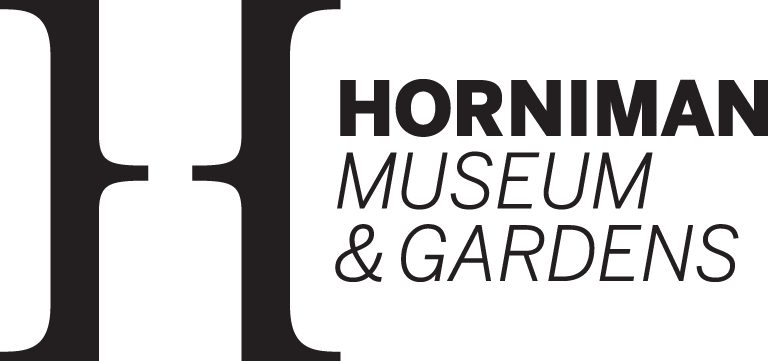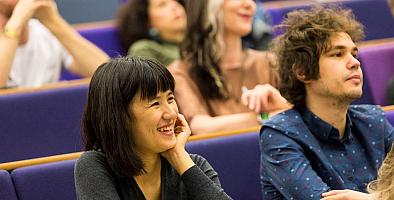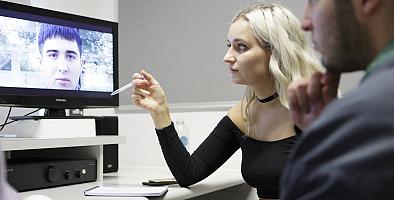MA
Anthropology & Museum Practice
Content navigation menu
Why study MA Anthropology & Museum Practice at Goldsmiths
Fusing Goldsmiths' academic excellence and professional training from the Horniman Museum, the MA in Anthropology & Museum Practice provides you with a uniquely comprehensive set of skills.
- Whether you're a professional looking to expand your subject expertise in anthropology, or an anthropologist looking to move into the museum sector, the course will provide you with the skills and knowledge you need to make a difference in your career.
- This degree is run in partnership with the Horniman Museum and Gardens. You'll learn from professionals who work with the institution's world-renowned anthropology collection, and gain practical skills in curation and conservation, using material and digital archives, running museum education programmes and engaging diverse audiences.
- You'll analyse museums as sites of imagination and distinction, and think about how they can be more inclusive places.
- You'll learn from leading academics in the Department of Anthropology, which has been rated top 10 in the UK for anthropology in the QS World University Rankings by Subject 2024.
Contact the department
If you have specific questions about the degree, contact Sultan Doughan.
Length
1 year full-time or 2 years part-time
Fees
Home - full-time: £12520
Home - part-time: £6260
International - full-time: £23660
Department

This degree is run in partnership with the Horniman Museum and Gardens.
What you'll study
You will study the following compulsory modules:
| Module title | Credits |
|---|---|
| Museum Anthropology | 30 credits |
| Museum Practice | 30 credits |
| Anthropological Research Methods | 30 credits |
| Dissertation | 60 credits |
Dissertation
The dissertation will be your own independent research project, drawing on the theoretical, philosophical and practice-based traditions of anthropology and museology.
Careers
This course provides you with a unique opportunity to develop both your academic and practical skills in anthropology and museum practice. This combination will provide you with an excellent grounding for a career in museum and anthropology work. This could include roles such as:
- Curator
- Community education
- Outreach
- Exhibitions officer
Skills
Some of the skills you'll develop during the Masters include:
- A comprehensive understanding of the ecology, role and evolution of museums found throughout the world
- The ability to interpret museum collections within their broader political and ethical contexts
- Practical skills in curation and conservation, using material and digital archives, running museum education programmes and engaging diverse audiences
- Data skills
- Original research skills
- Networking skills
- Problem-solving
Entry requirements
You should normally have (or expect to be awarded) an undergraduate degree of at least second class standard in a relevant/related subject.
You might also be considered for some programmes if you aren’t a graduate or your degree is in an unrelated field, but have relevant experience and can show that you have the ability to work at postgraduate level.
International qualifications
We accept a wide range of international qualifications. Find out more about the qualifications we accept from around the world.
If English isn’t your first language, you will need an IELTS score (or equivalent English language qualification) of 6.5 with a 6.5 in writing and no element lower than 6.0 to study this programme. If you need assistance with your English language, we offer a range of courses that can help prepare you for postgraduate study.
Fees and funding
Annual tuition fees
These are the PG fees for students starting their programme in the 2024/2025 academic year.
- Home - full-time: £12520
- Home - part-time: £6260
- International - full-time: £23660
If your fees are not listed here, please check our postgraduate fees guidance or contact the Fees Office, who can also advise you about how to pay your fees.
It’s not currently possible for international students to study part-time under a student visa. If you think you might be eligible to study part-time while being on another visa type, please contact our Admissions Team for more information.
If you are looking to pay your fees please see our guide to making a payment.
Funding opportunities
There may be the following funding opportunities for you:
If you are a UK student you may be eligible for a postgraduate loan.
Meanwhile our Careers Service can also offer advice on finding work during your studies.
Paying your fees
Find out about paying your tuition fees.
Additional costs
In addition to your tuition fees, you'll be responsible for any additional costs associated with your course, such as buying stationery and paying for photocopying. You can find out more about what you need to budget for on our study costs page.
There may also be specific additional costs associated with your programme. This can include things like paying for field trips or specialist materials for your assignments. Please check the programme specification for more information.
How to apply
You apply directly to Goldsmiths using our online application system.
To complete your application, you will need to have:
- Details of your academic qualifications
- The email address of your referee who we can request a reference from, or alternatively a copy of your academic reference
- Copies of your educational transcripts or certificates
- A personal statement
You'll be able to save your progress at any point and return to your application by logging in using your username/email and password.
When to apply
We accept applications from October for students wanting to start the following September.
We encourage you to complete your application as early as possible, even if you haven't finished your current programme of study. It's very common to be offered a place that is conditional on you achieving a particular qualification.
Late applications will only be considered if there are spaces available.
If you're applying for funding, you may be subject to an earlier application deadline.
Selection process
Admission to many programmes is by interview, unless you live outside the UK. Occasionally, we'll make candidates an offer of a place on the basis of their application and qualifications alone.
Further guidance
Read our guide to applying for a postgraduate degree at Goldsmiths.
.jpg)





